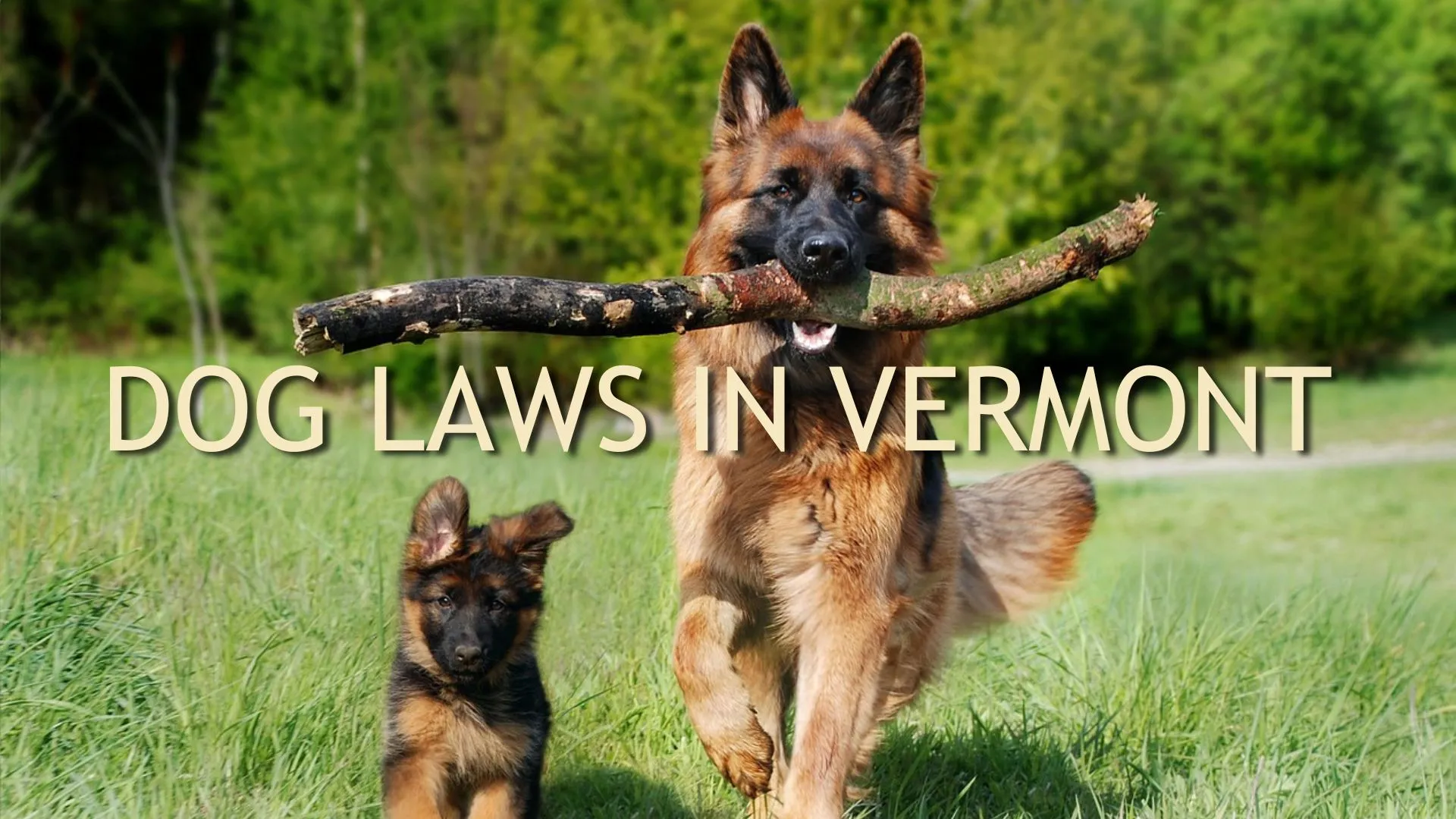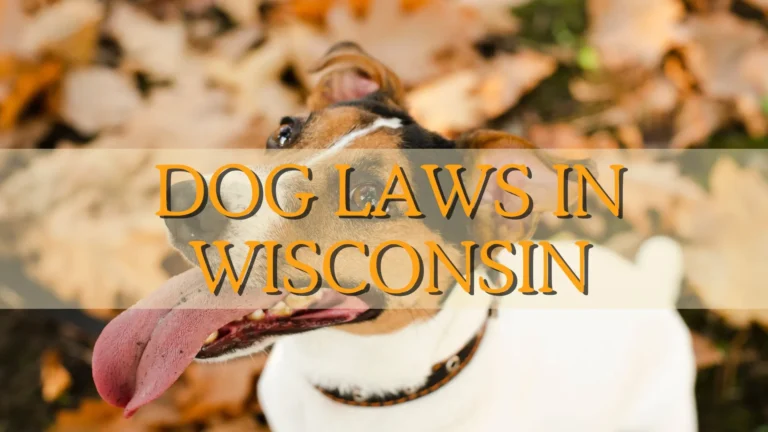Dog Laws in Vermont
You’d be surprised how often seemingly simple questions about dog ownership turn into trickier topics. Did you know that a whopping 63 million households in the US own a dog? That’s a lot of furry friends to keep happy and healthy, but it also means there are a lot of dog laws to navigate.
Understanding these laws in your state, like Vermont’s, is key to ensuring your pup’s safety and your own peace of mind. Dog laws can cover everything from licensing and vaccination requirements to leash laws and restrictions on certain breeds. Don’t worry, though, we’ll untangle this doggy legal leash together and make sure your walks in the beautiful Vermont scenery are stress-free for both of you!
Table of Contents
Dog Bite Laws in Vermont
Vermont, with its stunning landscapes and welcoming communities, is a fantastic place for dog lovers. However, even the most well-behaved pup can have an unexpected moment. Knowing Vermont’s dog bite laws can help you navigate a situation calmly and ensure the safety of everyone involved. While Vermont doesn’t have a specific dog bite statute, there are still important legal principles to understand. Here, we’ll delve into these laws and offer helpful advice.

The “One-Bite Rule”
Unlike some states with stricter dog bite laws, Vermont follows the “one-bite rule.” This means that, in general, a dog owner is only liable for injuries caused by their dog if they knew or should have known the dog had a history of aggression. This “should have known” aspect hinges on the concept of negligence.
Here’s how it breaks down:
- Prior Bites or Aggressive Behavior: If a dog has bitten someone before or exhibited aggressive behavior (growling, lunging), the owner is likely considered negligent if another attack occurs.
- Breed Specificity: While Vermont doesn’t have breed-specific bans, certain breeds are often stereotyped as aggressive. Owning one of these breeds doesn’t automatically mean liability, but if the owner hasn’ t taken steps to train and socialize the dog, it could strengthen a negligence claim.
- Confinement and Leash Laws: Failing to properly confine or leash a dog, especially in public spaces, could be seen as negligence if the dog bites someone.
What to Prove in a Dog Bite Incident
If you’re unfortunately bitten by a dog in Vermont, to pursue compensation for medical bills or other damages, you’ll need to prove the dog owner’s negligence. This means demonstrating:
- The Bite Occurred: Medical records and witness testimony can solidify this.
- The Dog Owner’s Knowledge of Propensity: Evidence of prior bites, aggressive behavior towards others, or breed stereotypes (if relevant) can support this.
- Negligence: This could involve the owner failing to leash the dog, properly confine it, or take steps to address known aggression.
Important Considerations Beyond the “One-Bite Rule”
While the “one-bite rule” is central to dog bite liability in Vermont, there are additional factors to consider:
- Provocation: If you were trespassing on private property or provoking the dog, it could weaken your claim.
- Comparative Negligence: Vermont courts may consider if your actions contributed to the bite, potentially reducing any damages awarded.
- Municipal Leash Laws: Many Vermont towns and cities have leash laws. Violating these laws could strengthen the dog owner’s defense.
Leash Laws and Animal Control Regulations
Beyond dog bite liability, understanding leash laws and animal control regulations is crucial for responsible dog ownership in Vermont. These laws vary by municipality, but generally require dogs to be leashed in public spaces and under owner control. Here are some helpful resources:
- Vermont Department of Agriculture, Food & Markets – Animal Health Division: Provides information on leash laws and animal control contact details
- Vermont League of Cities and Towns: Offers resources to find contact information for your local animal control department
Reporting Dog Bites and Aggressive Behavior
If you’re bitten by a dog, it’s crucial to report the incident immediately, even if the injuries seem minor. This can be done through:
- Local Animal Control: Reporting the bite helps track the dog’s history and ensures proper intervention if needed.
- Medical Professional: Seek medical attention for the bite to document the injury and receive necessary treatment.
- Police (if necessary): If the bite was severe or the owner was negligent, contacting the police might be necessary.
Tips for Responsible Ownership
- Proper Training and Socialization: Invest in training your dog to obey basic commands and be comfortable around different people and animals.
- Leash Laws and Control: Always follow leash laws and maintain control of your dog in public spaces.
- Secure Confinement: Ensure your dog is properly fenced or contained in your yard to prevent escapes.
- Responsible Breed Selection: Research breeds and choose one that fits your lifestyle and experience level.
- Veterinarian Care: Regular veterinary checkups can help identify any potential health issues that might contribute to aggression.
Dog Barking and Noise Laws in Vermont
Vermont, with its idyllic towns and peaceful landscapes, is a haven for nature lovers and their furry companions. However, even the most well-behaved pup can become a canine chorus conductor at times. Understanding Vermont’s dog barking and noise laws is key to maintaining a harmonious relationship with your neighbors and ensuring your dog doesn’t become a source of unwanted sonic entertainment.

Vermont’s Municipal Approach
Unlike some states with specific dog barking statutes, Vermont leaves noise regulations to individual municipalities. This means each town or city has its own ordinance outlining acceptable noise levels and how to address disturbances, including those caused by dog barking.
Finding Your Local Ordinance
Here’s how to navigate the world of Vermont’s municipal noise regulations:
- Town or City Website: Most Vermont municipalities have official websites. Look for a section on “Animal Control” or “Ordinances” where you can likely find the noise ordinance specific to your area.
- Town Clerk’s Office: If you’re struggling to find the ordinance online, contacting your town clerk’s office is a reliable way to obtain a copy.
Dog Barking Ordinance
While the specifics vary by municipality, many Vermont noise ordinances share common elements:
- Decibel Limits: These ordinances might set a decibel limit for acceptable noise levels during specific times (daytime vs. nighttime).
- Duration and Frequency: They may define what constitutes excessive barking, such as continuous barking for a set period or repeated barking throughout the day/night.
- Reasonable Person Standard: The ordinance might use a “reasonable person” standard. This means the noise must be unreasonable and disturb a person of normal sensibilities in their own dwelling.
Common Exceptions to Dog Barking Ordinances
Even with local ordinances in place, there are often exceptions to consider:
- Emergency Situations: If a dog barks due to a perceived threat, like a break-in or suspicious activity, it’s unlikely to violate the ordinance.
- Brief Barking: Short barks of excitement or alerts are generally not considered excessive.
- Working Dogs: Farm dogs or other working dogs performing their duties might be exempt from noise restrictions.
Resolving Barking Issues with Neighbors
Preventing a barking issue before it becomes a neighborly dispute is ideal. Here are some proactive steps:
- Training and Enrichment: Proper training and providing mental stimulation can reduce boredom barking.
- Desensitization: If your dog barks at triggers (mail delivery, people outside), desensitization training can help.
- Addressing Underlying Issues: There might be medical reasons behind excessive barking. Consult your veterinarian.
- Communication with Neighbors: Talk to your neighbors about any concerns and explore solutions together.
If a Noise Complaint is Filed Against You
If you receive a noise complaint, here’s how to handle it:
- Be Respectful: Acknowledge the concern and apologize for any inconvenience.
- Explain Steps Taken: Outline steps you’re taking to address the barking.
- Work with Animal Control: If animal control is involved, cooperate with them and follow their guidance.
- Consider Mediation: Some municipalities offer mediation services to resolve barking issues amicably.
Additional Resources
Here are some helpful resources:
- Vermont Veterinary Medical Association: Connects you with licensed veterinarians who can offer training advice
- American Society for the Prevention of Cruelty to Animals (ASPCA): Provides information on dog training and behavior modification
Dog Poop Disposal Laws in Vermont
Vermont, known for its stunning scenery and vibrant communities, is a haven for dog lovers. However, with responsible dog ownership comes the essential task of cleaning up after your furry friend. Understanding Vermont’s dog waste disposal laws isn’t just about legal compliance; it’s about being a considerate neighbor and protecting the environment.

Statewide Dog Poop Law
Unlike some states with specific dog waste disposal statutes, Vermont doesn’t have a single, overarching law on the subject. However, don’t let this absence fool you. Responsibility for pet waste disposal falls under two key areas:
- Municipal Ordinances: Many Vermont towns and cities have ordinances mandating the proper disposal of dog waste. These ordinances typically require dog owners to pick up after their pets in public spaces.
- Statewide Public Health and Environmental Regulations: Even without a dedicated dog poop law, Vermont has regulations concerning public health and environmental protection that indirectly apply to pet waste disposal.
Local Dog Waste Disposal Ordinance
Since Vermont relies on municipal ordinances, knowing your specific town or city’s regulations is crucial. Here’s how to find them:
- Town or City Website: Most Vermont municipalities have official websites. Look for sections on “Animal Control” or “Ordinances” where you can likely find the dog waste disposal ordinance specific to your area.
- Town Clerk’s Office: If you’re struggling to find the ordinance online, contacting your town clerk’s office is a reliable way to obtain a copy.
Vermont Dog Waste Disposal Ordinance
While the specifics vary by municipality, many Vermont dog waste disposal ordinances share common elements:
- Mandatory Pick-Up: These ordinances typically require dog owners to pick up after their pets in all public spaces (parks, sidewalks, trails, etc.).
- Carrying Bags: They might mandate that dog owners carry appropriate waste disposal bags while walking their dogs.
- Proper Disposal: The ordinance may specify how to dispose of the waste, such as in designated trash receptacles or by double-bagging and placing it in your regular trash bin at home (check with your local waste disposal provider).
- Fines for Non-Compliance: Violating the ordinance could result in fines for dog owners who fail to pick up after their pets.
Environmental Concerns and Responsible Ownership
Even if your town doesn’t have a specific dog waste disposal ordinance, cleaning up after your dog is vital for environmental and public health reasons:
- Water Contamination: Dog waste contains bacteria and parasites that can contaminate waterways and pose a threat to human and animal health.
- Nutrient Overload: Left undecomposed, dog waste can contribute to excessive nutrients in our water bodies, leading to harmful algal blooms.
- Public Health Hazards: Dog waste can be a breeding ground for parasites and bacteria that can spread diseases to humans and other pets.
Tips and Resources
Responsible dog ownership goes beyond following the law. Here are some tips to be a poop-scooping pro:
- Always Carry Bags: Make waste disposal bags a permanent fixture in your dog walking routine.
- Double-Bagging: This helps prevent leaks and unpleasant odors.
- Dispose of Waste Properly: Follow your town’s guidelines or dispose of double-bagged waste in your regular trash bin at home (check with your local waste disposal provider).
- Leave No Trace: Don’t leave waste bags behind in parks or trails. Pack them out with you.
Dog Licensing Laws in Vermont
Vermont, with its breathtaking landscapes and welcoming communities, is a haven for dog lovers. But before you hit the hiking trails with your furry friend, ensure they’re properly licensed. Dog licensing in Vermont isn’t just about following the law; it’s about responsible pet ownership and ensuring your dog’s safety. This comprehensive guide will equip you with everything you need to know about Vermont’s dog licensing laws.

The Importance of Dog Licensing
Dog licensing offers several benefits for both you and your canine companion:
- Identification: A license tag acts as a crucial form of identification for your dog. If they ever get lost, a license tag can significantly increase the chances of a safe return.
- Rabies Vaccination Proof: Obtaining a license typically requires proof of current rabies vaccination, which is vital for your dog’s health and public safety.
- Funding for Animal Shelters and Services: Licensing fees contribute to vital services such as animal control, rabies prevention programs, and responsible pet ownership initiatives.
- Fines for Non-Compliance: Failing to license your dog can result in fines.
Vermont’s Dog Licensing Requirements
Here’s a breakdown of Vermont’s dog licensing laws:
- Who Needs a License: All dogs over six months old residing in Vermont must be licensed.
- Licensing Location: Licenses are typically obtained through your town or city clerk’s office.
- Licensing Timeline: Dogs must be licensed annually on or before April 1st. If you acquire a dog after April 1st, you’ll need to license it within 30 days of ownership.
Required Documents for Dog Licensing
When applying for your dog’s license, be prepared to present the following documents:
- Proof of Rabies Vaccination: A current rabies certificate issued by a licensed veterinarian is mandatory.
- Proof of Spay/Neuter Status (Optional, but affects fees): While not mandatory for all dogs, spaying or neutering your dog typically reduces the licensing fee. Provide a certificate from a veterinarian if your dog is spayed/neutered.
Vermont Dog Licensing Fees
Licensing fees in Vermont vary depending on your dog’s spay/neuter status and the time of application. Here’s a general breakdown:
- Spayed/Neutered Dog (Before April 1st): $9.00
- Spayed/Neutered Dog (After April 1st): $11.00
- Intact Dog (Before April 1st): $13.00
- Intact Dog (After April 1st): $17.00
Renewing Your Dog’s License
Dog licenses in Vermont are valid for one year. Renewal notices are typically mailed out by your town or city clerk’s office before the expiration date. Renewal can often be done by mail, online (if offered), or in person at the clerk’s office.
Benefits of Early Renewal
Renewing your dog’s license promptly ensures continuous legal compliance and avoids any potential late fees.
Exemptions from Dog Licensing
There are limited exceptions to Vermont’s dog licensing requirements:
- Service Dogs: Legally documented service dogs may be exempt from licensing requirements. Contact your town or city clerk’s office for details.
- Dogs Under Six Months Old: Puppies under six months old are not required to be licensed. However, rabies vaccination is still crucial for their health and safety.
Finding Your Local Town or City Clerk’s Office
Here’s how to locate your town or city clerk’s office for dog licensing purposes:
- Town or City Website: Most Vermont municipalities have official websites. Look for a section on “Town Clerk” or “Licensing” to find contact information.
- Vermont League of Cities and Towns: Provides a searchable directory of Vermont municipalities
Dog Leash Laws in Vermont
Vermont, a state renowned for its picturesque landscapes and charming towns, is a haven for dog lovers and their furry companions. Exploring scenic trails, strolling through vibrant downtowns, and enjoying the fresh air are all activities best shared with your canine friend. However, ensuring a safe and enjoyable experience for everyone requires understanding Vermont’s dog leash laws. This comprehensive guide will equip you with the knowledge you need to navigate leash regulations and be a responsible dog owner.

The Importance of Dog Leash Laws
Leash laws serve several crucial purposes:
- Public Safety: Leashes help maintain control of your dog, preventing unexpected interactions with people or other animals that could lead to injuries or altercations.
- Protecting Your Dog: A leash prevents your dog from running into traffic, encountering wildlife, or getting lost.
- Peace of Mind for Others: Knowing dogs are leashed provides a sense of security for people who might be nervous around canines.
Vermont’s Approach to Dog Leashes
Unlike some states with statewide leash laws, Vermont takes a more localized approach. This means leash regulations are primarily determined by individual municipalities (towns and cities). Here’s how to find the specific leash laws in your area:
- Town or City Website: Most Vermont municipalities have official websites. Look for sections on “Animal Control” or “Ordinances” where you can likely find the leash law specific to your area.
- Town Clerk’s Office: If you’re struggling to find the ordinance online, contacting your town clerk’s office is a reliable way to obtain a copy.
Common Elements of Dog Leash Laws
While the specifics vary by municipality, many Vermont leash ordinances share common elements:
- Leash Requirement in Public Spaces: Dogs typically must be leashed on public property, including parks, sidewalks, trails, and public buildings (exceptions may exist for designated off-leash areas).
- Leash Length Restrictions: Some ordinances might specify the maximum leash length, often ranging from 6 to 10 feet.
- Voice or Physical Control: Even in designated off-leash areas, maintaining control of your dog with voice commands or a leash might be required.
Additional Considerations
Responsible leash use goes beyond simply having a leash attached. Here are some key points to remember:
- Leash Strength and Maintenance: Ensure your leash is strong and in good condition to prevent accidental breaks.
- Proper Leash Etiquette: Maintain a comfortable distance from others while walking your dog on a leash.
- Respecting Designated Off-Leash Areas: If a park has an off-leash area, ensure your dog is socialized and well-behaved before letting them off-leash.
Exceptions to Dog Leash Laws
There might be exceptions to leash laws in some situations:
- Private Property: With the property owner’s permission, your dog might be allowed off-leash in a fenced-in yard.
- Working Dogs: Certain working dogs, such as service animals or hunting dogs while working, might be exempt from leash laws. However, they must still be under the handler’s control.
Consequences of Violating Dog Leash Laws
Violating dog leash laws in Vermont can result in fines for the dog owner. The specific amount can vary by municipality.
Finding Designated Off-Leash Areas
Many Vermont towns and cities have designated off-leash dog parks where your furry friend can frolic freely. Here’s how to find them:
- Town or City Website: Municipal websites often list dog parks and their locations.
- Local Apps: Some apps can help locate dog parks near you.
- Word-of-Mouth: Ask fellow dog owners or local pet stores for recommendations.
Promoting Responsible Dog Ownership
Being a responsible dog owner goes beyond leash laws. Here are some additional tips:
- Proper Training: Invest in training your dog to obey basic commands, including leash walking.
- Socialization: Expose your dog to different people, animals, and environments to promote calmness and confidence around others.
- Waste Management: Always carry bags and properly dispose of your dog’s waste, even in off-leash areas.
Dangerous Dog Laws in Vermont
Vermont, with its breathtaking scenery and welcoming communities, is a haven for dog lovers. However, even the most well-intentioned canine can exhibit unexpected aggression. Understanding Vermont’s dangerous dog laws is crucial for both public safety and responsible ownership. While Vermont doesn’t have a single, statewide “dangerous dog” statute, there are legal principles and municipal ordinances that address potentially dangerous canines.

The Absence of a Statewide “Dangerous Dog” Law
Unlike some states with specific “dangerous dog” classifications and mandated procedures, Vermont doesn’t have a single, overarching law defining and regulating dangerous dogs. However, this doesn’t mean there’s no legal framework in place. Here’s how Vermont approaches potentially dangerous dogs:
- Municipal Ordinances: Many Vermont towns and cities have animal control ordinances that address aggressive or dangerous dog behavior. These ordinances might define dangerous dogs based on specific actions (e.g., biting, attacking) or breeds (though breed-specific bans are uncommon).
- General Dog Bite Laws: Vermont adheres to a “one-bite rule” for dog bites. This means, in general, a dog owner is only liable for injuries caused by their dog if they knew or should have known the dog had a history of aggression.
Local Dangerous Dog Ordinance
Since Vermont relies on municipal ordinances, knowing your specific town or city’s regulations is crucial. Here’s how to find them:
- Town or City Website: Most Vermont municipalities have official websites. Look for sections on “Animal Control” or “Ordinances” where you can likely find the ordinance specific to your area.
- Town Clerk’s Office: If you’re struggling to find the ordinance online, contacting your town clerk’s office is a reliable way to obtain a copy.
Typical Dangerous Dog Ordinance
While the specifics vary by municipality, many Vermont dangerous dog ordinances share some common elements:
- Definition of a Dangerous Dog: The ordinance might define a dangerous dog based on specific actions, such as biting a person or another animal without provocation, or exhibiting aggressive behavior towards people or animals.
- Investigation Process: Following a reported incident, an animal control officer will likely investigate the situation and determine if the dog meets the definition of “dangerous” under the ordinance.
- Potential Outcomes: Outcomes could include requiring the owner to:
- Muzzle the dog in public
- Confine the dog securely
- Undergo obedience training with the dog
- In extreme cases, the dog might be deemed too dangerous to own and subject to impoundment or euthanasia (depending on the severity of the incident and the dog’s history).
“One-Bite Rule”
Even without a specific dangerous dog law, Vermont’s “one-bite rule” plays a significant role in situations involving dog bites. Here’s a breakdown:
- Owner Liability: Generally, a dog owner is only liable for injuries caused by their dog if they knew or should have known the dog had a history of aggression.
- Evidence of Propensity: This could include prior bite incidents, documented aggressive behavior towards others, or breed stereotypes (if relevant in your municipality’s ordinance).
Signs of Potential Aggression
While not a foolproof method, being aware of potential signs of aggression in dogs can help prevent incidents:
- Growling, Snarling, Snapping: These are clear warnings that a dog feels threatened and might bite.
- Stiff Body Language: Signs like a raised tail, flattened ears, and a tense posture indicate potential aggression.
- Direct Eye Contact: While not always a sign of aggression, prolonged, intense eye contact can make some dogs feel challenged.
If You Encounter a Potentially Dangerous Dog
If you encounter a dog exhibiting aggressive behavior, here’s what to do:
- Stay Calm and Avoid Eye Contact: Sudden movements or staring can escalate the situation.
- Back Away Slowly: Don’t run, as this could trigger a chase response in the dog.
- Seek Shelter if Necessary: If the dog appears highly aggressive, find a safe place to retreat, such as a building or behind a fence.
- Report the Incident: If bitten or witnessing an aggressive incident, contact animal control immediately.
Dog Health and Welfare Laws in Vermont
Vermont, renowned for its picturesque landscapes and vibrant communities, is a haven for dog lovers. But beyond enjoying the outdoors with your furry friend, ensuring their health and well-being is paramount. Understanding Vermont’s dog health and welfare laws plays a crucial role in responsible pet ownership. While there isn’t a single, comprehensive “dog welfare law” in Vermont, several regulations and best practices contribute to canine health and happiness.

The Cornerstones of Dog Health and Welfare
Several key areas form the foundation of dog health and welfare in Vermont:
- Animal Cruelty Laws: Vermont, like most states, has animal cruelty statutes that protect dogs from neglect, abuse, and abandonment.
- Rabies Vaccination Requirements: Rabies vaccination is mandatory for all dogs over six months old in Vermont, protecting both canine and public health.
- Municipal Ordinances: Many Vermont towns and cities have animal control ordinances addressing issues like tethering, proper shelter, and sanitation, all impacting a dog’s well-being.
- Veterinary Care: While not a legal requirement, ensuring your dog receives regular veterinary care is crucial for their health and happiness.
Animal Cruelty Laws
Vermont’s animal cruelty laws, outlined in Title 13 of the Vermont Statutes Annotated, prohibit acts of cruelty against animals, including dogs. Here’s a breakdown of key points:
- Prohibited Actions: These include inflicting unnecessary pain, suffering, or death upon an animal, depriving them of necessary food, water, or shelter, or abandoning them.
- Investigative Process: Animal control officers or law enforcement officials investigate suspected cruelty cases.
- Potential Penalties: Violations of animal cruelty laws can result in fines, jail time, and the potential for animal confiscation.
Rabies Vaccination
Rabies is a deadly virus that can infect dogs and humans. Vermont law mandates rabies vaccination for all dogs over six months old. Here’s what you need to know:
- Vaccination Requirements: Dogs must be vaccinated by a licensed veterinarian using a vaccine approved by the United States Department of Agriculture (USDA).
- Proof of Vaccination: A current rabies vaccination certificate is required for dog licensing and may be requested during interactions with animal control.
- Booster Shots: The frequency of rabies booster shots depends on the type of vaccine used. Consult your veterinarian for specific recommendations.
Municipal Ordinances
Many Vermont municipalities have animal control ordinances that address dog welfare concerns. Here are some common examples:
- Tethering Restrictions: These ordinances might limit the duration or method of tethering a dog, ensuring they have adequate access to food, water, shelter, and proper space for movement.
- Shelter Requirements: Ordinances might specify minimum standards for dog shelters, including protection from the elements and appropriate size based on the dog’s breed and needs.
- Sanitation Regulations: These could address waste disposal requirements and preventing unsanitary living conditions for dogs.
Veterinary Care in Dog Health
While not mandated by law, ensuring your dog receives regular veterinary care is crucial for their health and well-being. Here’s why:
- Preventative Care: Regular veterinary checkups allow for early detection and treatment of potential health issues.
- Vaccinations: Beyond rabies, several other vaccinations protect dogs from common and potentially life-threatening diseases.
- Parasite Prevention: Veterinarians can recommend parasite control medications to safeguard your dog’s health.
Additional Resources
Here are some helpful resources:
- Vermont Veterinary Medical Association: Connects you with licensed veterinarians who can provide guidance on dog health and welfare
- Vermont Department of Agriculture, Food & Markets – Animal Health Division: Provides information on rabies vaccination requirements and other canine health topics
- The Humane Society of the United States: Offers resources on responsible pet ownership and animal welfare
Dog Public Access Laws in Vermont
Vermont, a state famed for its breathtaking scenery and welcoming towns, is a paradise for dog owners and their canine companions. From exploring scenic trails to strolling through charming downtowns, Vermont offers a plethora of opportunities for outdoor adventures with your furry friend. However, navigating public spaces with your dog requires understanding Vermont’s dog public access laws. This comprehensive guide will equip you with the knowledge you need to ensure a safe and enjoyable experience for both you and your pup.

The Nuances of Dog Public Access
Unlike some states with clear-cut public access laws for dogs, Vermont’s approach is more nuanced. Here’s a breakdown of the key points:
- Limited Statewide Laws: There are no overarching state laws specifically governing dog access to public spaces in Vermont.
- Focus on Municipal Ordinances: Individual towns and cities primarily determine public access regulations for dogs through animal control ordinances. These ordinances might address leash requirements, restrictions on specific breeds, designated off-leash areas, and rules for businesses and public establishments.
Local Dog Public Access Laws
Since Vermont relies on municipal ordinances, knowing your specific town or city’s regulations is crucial. Here’s how to find them:
- Town or City Website: Most Vermont municipalities have official websites. Look for sections on “Animal Control” or “Ordinances” where you can likely find the public access laws specific to your area.
- Town Clerk’s Office: If you’re struggling to find the ordinance online, contacting your town clerk’s office is a reliable way to obtain a copy.
Common Themes in Dog Public Access Ordinances
While details vary by municipality, many Vermont dog public access ordinances share some common elements:
- Leash Requirements: Leashes are often mandatory in public spaces like parks, sidewalks, trails, and public buildings.
- Designated Off-Leash Areas: Many towns and cities have designated dog parks where your pup can roam leash-free. Following park rules for responsible off-leash behavior is essential.
- Restricted Breeds: Some municipalities might have breed-specific restrictions, but these are uncommon in Vermont.
- Business and Establishment Regulations: Private businesses can choose to allow or restrict dogs on their premises. Always check signage or inquire within before entering with your dog.
Dog-Friendly Businesses
While there are no statewide regulations mandating dog-friendliness in businesses, some Vermont establishments welcome canine companions. Here’s how to find them:
- Look for Signs: Many businesses with open door policies for dogs will display signage indicating so.
- Online Resources: Websites and apps like BringFido [https://www.bringfido.com/] can help locate dog-friendly businesses in your area.
- Call Ahead: Don’t hesitate to call the business directly to confirm their policy on dogs.
Responsible Dog Ownership
Even in dog-friendly areas, responsible ownership is crucial:
- Leash Etiquette: Maintain control of your dog on a leash, ensuring a safe distance from others.
- Clean Up After Your Pup: Always carry waste disposal bags and properly dispose of your dog’s waste, even in designated off-leash areas.
- Respectful Off-Leash Interactions: If your dog enjoys off-leash time, ensure they are well-behaved and socialized before letting them roam freely.
- Adhere to Business Policies: Respect the rules of dog-friendly businesses to maintain positive experiences for all patrons.
Advocacy for Dog-Friendly Public Space
Vermont offers a plethora of beautiful outdoor spaces for you and your furry friend to explore. Organizations like the Vermont Dog Owners Coalition [[invalid URL removed]] advocate for responsible dog ownership and increased dog-friendly access in the state.
Dog Travel and Transportation Laws in Vermont
Vermont, with its picturesque landscapes and charming towns, beckons adventurous souls and their canine companions. Planning a road trip, hitting the hiking trails, or simply taking your dog for a vet visit all involve transporting them safely and legally. Understanding Vermont’s dog travel and transportation laws is crucial for a smooth journey. While there aren’t extensive regulations, some key considerations ensure a stress-free travel experience for you and your furry friend.
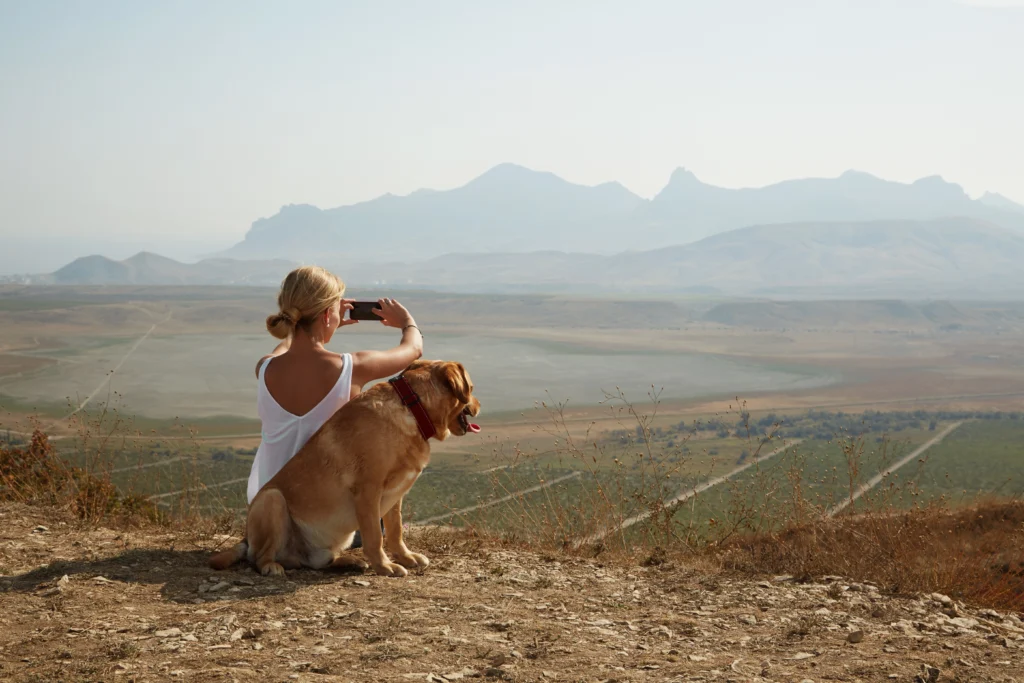
The Importance of Responsible Dog Transportation
Responsible dog transportation goes beyond simply getting your pup from point A to point B. Here’s why it matters:
- Safety: Properly securing your dog in a vehicle prevents them from becoming projectiles in case of an accident.
- Comfort: Ensuring your dog has adequate space, ventilation, and access to water during transport minimizes stress and discomfort.
- Public Health: Maintaining a clean and sanitary environment while transporting your dog helps prevent the spread of germs or parasites.
General Considerations
There are no specific Vermont laws mandating dog transportation methods within the state. However, following these general guidelines ensures responsible pet ownership:
- Vehicle Restraint: Use a crate, carrier, or harness specifically designed for dog travel in your vehicle. Ensure it’s the appropriate size for your dog and securely anchored to the car’s frame.
- Climate Control: Maintain a comfortable temperature inside the vehicle, especially during hot or cold weather. Avoid leaving your dog unattended in a parked car for extended periods.
- Hydration and Breaks: Provide your dog with frequent access to clean water during travel. Take breaks every few hours to allow them to relieve themselves and stretch their legs.
Planning for Out-of-State Travel with Your Dog
If you’re planning a trip outside Vermont with your furry friend, additional considerations come into play:
- Rabies Vaccination: Ensure your dog’s rabies vaccination is current. Some states might have specific requirements for the type of vaccine and validity period.
- Health Certificate: Certain states might require a health certificate issued by a licensed veterinarian within a specific timeframe before your dog can enter.
- Breed Restrictions: Some localities might have breed-specific restrictions for visiting dogs. Research your destination’s regulations to avoid any surprises.
Resources
Here are some helpful resources for planning dog-friendly travel:
- National Park Service – Pets: Provides information on pet policies in national parks
- USDA Animal and Plant Health Inspection Service (APHIS) – Pet Travel: Offers guidance on pet travel requirements between states
- BringFido: Website and app that helps find dog-friendly accommodations and activities
Flying with Your Dog
While Vermont doesn’t have specific regulations for flying with dogs, each airline has its own pet travel policies. Here are some general points to remember:
- Contact the Airline: Always check the airline’s pet travel policy for specific requirements regarding crate size, weight restrictions, and documentation needed.
- Reservations: Reservations for pet travel are often required and can fill up quickly, especially during peak seasons.
- Airport Procedures: Familiarize yourself with the airport’s pet handling procedures to avoid delays or stress for your dog.
Additional Considerations
Federal laws protect the right of people with disabilities to travel with trained service animals. Here’s what to know:
- Service Animal Definition: The Americans with Disabilities Act (ADA) defines a service animal as a dog trained to do work or perform tasks for a person with a disability.
- Documentation Requirements: Airlines typically don’t require documentation for service animals, but some might ask for verification of disability and training.
- Service Animal Behavior: Service animals must be well-behaved and under their handler’s control at all times during travel.
Dog Housing and Accommodation Laws in Vermont
Vermont, a state known for its breathtaking scenery and welcoming communities, is a haven for dog lovers and their furry companions. Whether you’re a renter seeking a dog-friendly apartment or a traveler planning a vacation with your pup, understanding Vermont’s dog housing and accommodation laws can ensure a smooth experience. While there isn’t a single, overarching “dog housing law” in Vermont, several regulations and best practices contribute to responsible pet ownership and fair housing for both pet owners and non-pet owners. This comprehensive guide will equip you with the knowledge you need to navigate dog housing and accommodation in Vermont.
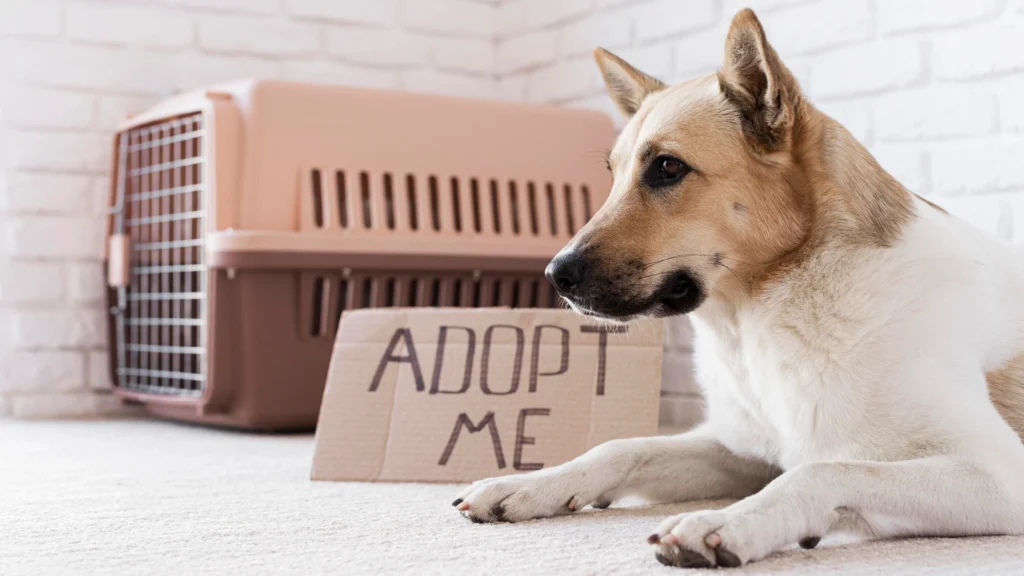
The Fair Housing Act and Assistance Animals
The Fair Housing Act (FHA), a federal law, prohibits discrimination based on disability in housing. In Vermont, this applies to assistance animals, including service dogs and emotional support animals (ESAs).
- Service Animals: These are dogs trained to perform specific tasks that assist individuals with disabilities, such as guide dogs for the blind or hearing assistance dogs. Landlords are legally obligated to allow service animals in all housing units, regardless of pet policies.
- Emotional Support Animals: While not trained to perform specific tasks, ESAs provide emotional support to individuals with disabilities. Landlords can generally require documentation from a licensed mental health professional to verify the need for an ESA but cannot charge additional fees or deposits specifically for ESAs.
Housing Laws for Pets
While the FHA protects assistance animals, Vermont’s Fair Housing Laws don’t mandate landlords to accept pets in their rental properties. Here’s what you need to know:
- Landlord Discretion: Landlords have the right to decide whether to allow pets in their rental units and establish reasonable pet policies. These policies can include breed restrictions, size limitations, and pet deposits.
- Reasonable Pet Policies: These policies should be objective, non-discriminatory, and clearly outlined in the lease agreement. Common restrictions might include limitations on the number of pets allowed or requiring pets to be spayed/neutered.
Dog-Friendly Housing in Vermont
Here are some tips for finding dog-friendly housing in Vermont:
- Search Websites: Several online rental platforms allow you to filter searches for “pet-friendly” properties.
- Contact Property Management Companies: Inquire about their pet policies before scheduling viewings.
- Word-of-Mouth: Reach out to fellow dog owners for recommendations on dog-friendly rental properties or neighborhoods.
Dog-Friendly Accommodations
Vermont offers a variety of pet-friendly lodging options for travelers with canine companions:
- Hotels and Motels: Many hotels and motels welcome dogs with specific pet policies (e.g., size restrictions, breed limitations, additional fees). Always research and book pet-friendly accommodations in advance.
- Vacation Rentals: Some vacation rentals cater to dog owners and might offer amenities like pet beds or fenced yards.
- Campgrounds: Several campgrounds in Vermont allow responsible pet ownership, but leash laws and restrictions might apply. Research specific policies before booking your campsite.
Resources
Here are some helpful resources for finding dog-friendly housing and accommodation in Vermont:
- BringFido: Website and app that helps locate pet-friendly rentals and accommodations
- Vermont Lodging Association: Provides a directory of lodging establishments in Vermont, some of which might be dog-friendly
- Vermont Apartment Association: Offers resources for renters in Vermont, which can help with understanding pet policies
Responsible Dog Ownership
Being a responsible dog owner is paramount in any housing or accommodation situation:
- Respect Pet Policies: Always adhere to established pet policies regarding breed restrictions, size limitations, leash use, and waste disposal.
- Cleanliness and Maintenance: Be responsible for cleaning up after your dog and any damage they might cause to the property.
- Noise Control: Ensure your dog’s barking or other vocalizations don’t disturb other residents or guests.
Dog Adoption and Sale Laws in Vermont
Vermont, renowned for its picturesque landscapes and vibrant communities, is a haven for animal lovers. Whether you’re considering welcoming a furry friend into your life through adoption or responsible purchase, understanding Vermont’s dog adoption and sale laws is crucial. While there isn’t a single, state-wide statute governing dog adoption, several regulations and best practices ensure ethical treatment of animals and responsible pet ownership. This comprehensive guide will equip you with the knowledge you need to navigate dog adoption and sales in Vermont.

The Landscape of Dog Adoption
Vermont boasts a vibrant network of animal shelters and rescue organizations dedicated to placing homeless dogs in loving forever homes.
- Adoption Benefits: Adopting a dog from a shelter or rescue provides a loving home for a deserving animal, often already spayed/neutered and with some basic training.
- Adoption Process: The adoption process typically involves filling out an application, meeting potential canine companions, and undergoing a home visit to ensure a suitable environment. Adoption fees might vary depending on the organization.
Animal Welfare Regulations for Shelters and Rescues
Vermont prioritizes the welfare of animals in shelters and rescues. Here’s what you need to know:
- Licensing Requirements: Animal shelters and rescues operating in Vermont must obtain a kennel license from the Agency of Agriculture, Food & Markets.
- Animal Care Standards: These facilities must adhere to specific animal care standards outlined in Vermont’s Animal Welfare Regulations. This includes providing adequate food, water, shelter, veterinary care, and socialization for the animals in their care.
Rescue or Shelter Dog
Here are some resources to help you find your perfect canine companion through adoption in Vermont:
- Vermont Humane Federation: Provides a directory of shelters and rescues across the state
- Petfinder: Searchable database of adoptable pets from shelters and rescues nationwide
- Adopt-a-Pet: Another searchable database of adoptable pets from shelters and rescues across the country
Dog Adoption Practices
Adopting a dog is a lifelong commitment. Here are some responsible adoption practices to consider:
- Lifestyle Compatibility: Choose a dog that aligns with your lifestyle (e.g., activity level, living space).
- Meeting Your New Companion: Spend time interacting with potential adoptable dogs to ensure a good fit.
- Post-Adoption Support: Many shelters and rescues offer training resources or support groups to help with the transition for both you and your new pet.
Dog Sale Laws
While adoption is a noble choice, some individuals might prefer purchasing a dog from a breeder. Here’s what to know about Vermont’s dog sale laws:
- No Statewide Breeder Regulations: Unlike some states with specific breeder licensing requirements, Vermont doesn’t have a statewide breeder licensing system.
- Municipal Kennel Permits: Some Vermont towns and cities require kennel permits for breeders selling dogs. Research local ordinances to determine if this applies in your area.
- Consumer Protection Laws: Vermont’s consumer protection laws offer some protections for dog buyers. For example, the right to a full or partial refund if the dog is found to be unfit for purchase due to illness or congenital disabilities within a specific timeframe.
Finding a Reputable Dog Breeder
If you choose to purchase a dog from a breeder, responsible sourcing is crucial. Here are some tips:
- Research Breeds: Select a breed that aligns with your lifestyle and living situation.
- Breeder Reputation: Look for breeders who prioritize the health and well-being of their dogs and adhere to ethical breeding practices.
- On-Site Visit: Schedule a visit to the breeder’s facility to assess the conditions in which the dogs are kept.
Additional Considerations
Here are some additional points to consider before purchasing a dog from a breeder:
- Cost: The cost of a puppy can vary depending on the breed, breeder reputation, and pedigree.
- Contracts: Read and understand the terms of any sales contract before finalizing the purchase.
- Health Testing: Reputable breeders perform health screenings on their breeding stock to minimize the risk of genetic disorders in puppies.
Dog Park and Recreation Laws in Vermont
Vermont, a state famed for its breathtaking scenery and outdoor adventures, is a paradise for dog owners and their canine companions. From exploring scenic trails to enjoying vibrant town centers, Vermont offers a plethora of opportunities for you and your furry friend to bond in the fresh air. However, navigating dog-friendly recreation areas requires understanding Vermont’s dog park and recreation laws. This comprehensive guide will equip you with the knowledge you need for a safe and enjoyable experience for both you and your pup.

The Nuances of Dog Parks and Recreation
Unlike some states with standardized dog park regulations, Vermont’s approach is more decentralized. Here’s a breakdown of the key points:
- Limited State-Level Laws: There are no overarching state laws governing dog access to specific recreation areas in Vermont.
- Focus on Municipal Ordinances: Individual towns and cities primarily determine regulations for dog parks and recreation areas through animal control ordinances. These ordinances might address leash requirements in specific areas, designated off-leash spaces, and rules for waste disposal.
Local Dog Park and Recreation Area Regulations
Since Vermont relies on municipal ordinances, knowing your specific town or city’s regulations is crucial. Here’s how to find them:
- Town or City Website: Most Vermont municipalities have official websites. Look for sections on “Animal Control” or “Parks & Recreation” where you can likely find information on dog park etiquette and leash laws for specific recreational areas.
- Town Clerk’s Office: If you’re struggling to find the ordinance online, contacting your town clerk’s office is a reliable way to obtain a copy.
Common Themes in Vermont’s Dog Park Ordinances
While details vary by municipality, many Vermont dog park ordinances share some common elements:
- Leash Requirements: Leashes are often mandatory on trails, public pathways, and non-designated off-leash areas.
- Designated Off-Leash Areas: Many towns and cities have designated dog parks where your pup can roam leash-free. Following park rules for responsible off-leash behavior is essential.
- Waste Disposal: Always clean up after your dog, regardless of leash requirements or location. Most dog parks provide waste disposal bags and bins.
- Respecting Other Park Users: Maintain control of your dog and ensure they don’t disturb other park goers or wildlife.
Dog-Friendly Recreation
Beyond dog parks, Vermont offers various outdoor adventures for you and your furry friend:
- Hiking Trails: Several Vermont trails allow dogs, but leash laws might apply. Research specific trail regulations before embarking on your hike.
- State Parks: Some Vermont state parks welcome dogs, but leash laws and restrictions on specific areas are common. Check the Vermont State Parks website for details.
- Swimming Areas: While some lakes and ponds permit dog swimming, leash requirements and restrictions on entering the water might exist. Research local regulations before letting your dog take a dip.
Responsible Dog Ownership
Even in dog-friendly areas, responsible ownership is crucial:
- Leash Etiquette: Maintain control of your dog on a leash, ensuring a safe distance from others and wildlife.
- Socialization: Ensure your dog is well-behaved and socialized before letting them off-leash in designated areas.
- Weather Awareness: Be mindful of weather conditions and avoid strenuous activities during extreme temperatures.
- Respecting Wildlife: Keep your dog leashed and under control near wildlife habitats to minimize disruption.
Additional Resources
Here are some helpful resources for planning dog-friendly recreation in Vermont:
- BringFido: Website and app that helps locate dog-friendly trails, parks, and outdoor activities
- Vermont Department of Forests, Parks, and Recreation: Provides information on Vermont state parks and recreation areas, including some with dog-friendly policies
- Leave No Trace: Promotes responsible outdoor recreation practices, including tips for minimizing your dog’s impact on the environment
Dog Food and Nutrition Laws in Vermont
Vermont, a state renowned for its agricultural heritage and commitment to fresh, local food, extends this philosophy to the well-being of furry companions. While there aren’t specific state-mandated regulations on dog food ingredients or labeling, responsible pet ownership in Vermont involves understanding dog nutrition and making informed choices about your pup’s diet.

The Importance of Dog Nutrition
Proper nutrition forms the foundation of a dog’s health and well-being. A balanced diet provides your pup with the essential nutrients they need to maintain energy levels, support a healthy immune system, and promote optimal growth and development.
- Nutritional Needs: Dogs, like humans, require a balanced diet consisting of protein, carbohydrates, fats, vitamins, and minerals in appropriate proportions. The specific needs vary depending on breed, age, activity level, and overall health.
- Consulting Your Veterinarian: Your veterinarian is your best resource for understanding your dog’s unique nutritional needs and recommending a suitable diet based on their individual characteristics.
Dog Food Labeling and Marketing
While Vermont doesn’t have specific dog food labeling laws, federal regulations set forth by the Association of American Feed Control Officials (AAFCO) provide a framework for dog food labeling. Here’s a breakdown of key points to consider:
- AAFCO Statements: Look for AAFCO statements on the dog food label, indicating whether the food meets the nutritional requirements for complete and balanced nutrition or is intended as a supplement.
- Ingredient List: The ingredients are listed in descending order by weight, with the first few ingredients typically forming the bulk of the food.
- Guaranteed Analysis: This section provides the minimum percentages of protein, fat, fiber, and moisture content in the food.
Choosing a Dog Food in Vermont
Beyond AAFCO guidelines, consider these factors when selecting dog food in Vermont:
- Source of Protein: High-quality protein sources, such as chicken, fish, or lamb, are crucial for canine health.
- Whole vs. Processed Ingredients: Whole foods offer a more natural source of nutrients compared to heavily processed ingredients.
- Breed-Specific Needs: Some dog food formulas cater to specific needs of certain breeds, such as large breed puppies or senior dogs.
- Local and Sustainable Options: Vermont boasts a vibrant agricultural scene. Consider exploring locally sourced dog food options that prioritize sustainability.
Resources
Here are some resources to help you find high-quality dog food in Vermont:
- Local Pet Stores: Independent pet stores often have knowledgeable staff who can recommend dog food based on your pup’s needs.
- Veterinarian Recommendations: Consult your veterinarian for personalized advice on dog food selection.
- Online Resources: Websites like DogFoodAdvisor, provide reviews and information on various dog food brands. Remember to conduct further research and consult your veterinarian before making a final decision.
Alternative Diets in Vermont
While commercial dog food is a convenient option, some pet owners in Vermont choose alternative dietary approaches for their furry friends:
- Homemade Diets: Homemade diets allow for complete control over ingredients, but require careful planning and consultation with a veterinarian to ensure a balanced nutritional profile.
- Raw Food Diets: Raw food diets consist of uncooked meat, bones, and vegetables. These diets require research on proper handling and sanitation practices to avoid foodborne illnesses.
The Importance of Responsible Feeding Practices
Regardless of the type of dog food you choose, responsible feeding practices are crucial:
- Portion Control: Overfeeding can lead to obesity and related health problems. Follow feeding guidelines on the dog food label or consult your veterinarian for recommended portion sizes.
- Fresh Water: Always provide your dog with access to clean, fresh water throughout the day.
- Monitoring Food Intake: Observe your dog’s eating habits and consult your veterinarian if you notice changes in appetite or weight.
Dog Health and Veterinary Care Laws in Vermont
Vermont, a state known for its picturesque landscapes and focus on responsible living, prioritizes the well-being of all animals, including canine companions. While there aren’t specific state-mandated laws dictating veterinary care practices, Vermont fosters a pet-friendly environment where responsible pet ownership goes hand-in-hand with preventive healthcare and access to veterinary services. This comprehensive guide explores the legalities and best practices surrounding dog health and veterinary care in Vermont, empowering you to ensure your furry friend receives the care they need to live a long and healthy life.

The Importance of Veterinary Care for Dogs
Regular veterinary checkups are crucial for maintaining your dog’s health and well-being. These visits allow for early detection and treatment of potential health issues, vaccinations to prevent diseases, and guidance on proper nutrition and parasite control.
- Preventative Care: Regular veterinary checkups, including physical exams and parasite screenings, can identify potential problems early on when they’re often easier and less expensive to treat.
- Vaccinations: Vaccinations protect your dog from potentially life-threatening diseases like rabies, distemper, and parvovirus.
- Parasite Control: Regular parasite control measures like flea and tick prevention medications safeguard your dog from discomfort and potential diseases transmitted by parasites.
Veterinary Licensing
Vermont prioritizes qualified veterinary professionals caring for animals. Here’s what you need to know:
- State Board of Veterinary Medicine: The Vermont State Board of Veterinary Medicine licenses and regulates veterinarians in the state. You can verify a veterinarian’s license status on the Board’s website [[invalid URL removed]].
- Veterinarian Qualifications: Licensed veterinarians in Vermont complete Doctor of Veterinary Medicine (DVM) degrees from accredited institutions and pass rigorous licensing exams.
Finding a Veterinarian
Vermont offers a range of veterinary options to suit your needs:
- Private Practices: Many private veterinary practices throughout the state provide comprehensive veterinary care services.
- Emergency Veterinary Clinics: Emergency veterinary clinics operate 24/7 to handle urgent and critical situations.
- Shelters and Rescue Clinics: Some animal shelters and rescue organizations offer veterinary services, often at a reduced cost.
Considerations When Choosing a Veterinarian
Selecting the right veterinarian for your dog is vital for a trusting and long-lasting relationship. Here are some factors to consider:
- Location: Choose a veterinarian conveniently located for you and your dog.
- Services Offered: Ensure the veterinarian provides the services your dog needs, such as routine checkups, vaccinations, and surgical procedures (if necessary).
- Communication Style: Find a veterinarian whose communication style aligns with your needs. Open communication is crucial for making informed decisions about your dog’s health.
Financial Considerations for Veterinary Care
Veterinary care costs can vary depending on the services required. Here are some ways to manage veterinary expenses in Vermont:
- Pet Insurance: Consider pet insurance to help offset the financial burden of unexpected veterinary costs.
- Care Credit: Financing options like CareCredit might be available to help manage the cost of veterinary procedures.
- Veterinary Payment Plans: Some veterinary clinics offer payment plans to spread out costs.
Animal Cruelty Laws
Vermont takes animal cruelty seriously. Here’s what the law outlines:
- Vermont Statutes: Title 13 of the Vermont Statutes outlines animal cruelty laws, including the prohibition of overworking, underfeeding, or denying necessary medical attention to an animal.
- Reporting Animal Cruelty: If you suspect animal cruelty, you have a legal obligation to report it to your local animal control officer or law enforcement agency.
Responsible Dog Ownership
Beyond veterinary care, responsible dog ownership in Vermont encompasses several aspects:
- Licensing: Vermont requires all dogs four months of age or older to be licensed with your town or city clerk’s office.
- Vaccinations: Ensure your dog is up-to-date on all vaccinations as required by local ordinances (rabies vaccination is typically mandatory).
- Identification: Consider microchipping your dog for permanent identification in case they get lost.
- Preventative Measures: Practice responsible waste disposal, keep your dog leashed in designated areas, and socialize your dog to ensure they interact safely with other animals and people.
Dog Identification and Microchipping Laws in Vermont
Vermont, a state renowned for its breathtaking scenery and vibrant communities, is a haven for dog lovers. Whether you’re exploring scenic trails with your furry friend or enjoying a stroll through a charming town center, ensuring your dog is properly identified is crucial. While Vermont doesn’t mandate microchipping, dog licensing serves as the primary form of identification.
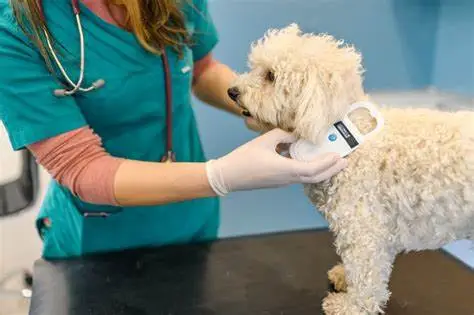
The Importance of Dog Identification
A lost dog can be a stressful and heartbreaking experience. Proper identification increases the chances of a safe and swift return. Here’s why it matters:
- Lost Dog Recovery: A collar with identification tags allows animal control officers or Good Samaritans to easily identify your dog and contact you.
- Licensing Compliance: Dog licensing in Vermont requires a collar and identification tag displaying the current license.
- Peace of Mind: Knowing your dog is properly identified provides peace of mind during walks, hikes, or any outdoor adventures.
The Primary Form of Identification
Vermont law mandates dog licensing as the primary form of identification for all dogs four months of age or older. Here’s what you need to know:
- Licensing Process: Contact your local town or city clerk’s office to obtain a dog license. Fees typically vary by municipality and might depend on your dog’s sterilization status.
- License Tags: The license comes with a tag that should be securely attached to your dog’s collar at all times. The tag displays your dog’s license number and rabies vaccination information.
- Renewal Requirements: Dog licenses in Vermont typically expire annually and require renewal to maintain legal compliance.
Benefits of Microchipping Your Dog
While not mandatory in Vermont, microchipping offers an additional layer of security for your dog. Here’s why microchipping is a valuable consideration:
- Permanent Identification: A microchip is a tiny implant placed under your dog’s skin containing a unique identification number. This number can be scanned by a veterinarian or animal shelter with a microchip reader, revealing your contact information.
- Increased Recovery Rates: Lost dogs with microchips are significantly more likely to be reunited with their owners compared to those relying solely on collar tags. Microchips are permanent and cannot be lost or fall off like collars.
- Nationwide Database: Microchip companies maintain nationwide databases where your contact information is linked to your dog’s microchip number. This allows shelters and veterinary clinics across the country to identify your dog and contact you if they are found.
Finding a Microchip for Your Dog
Microchipping is a simple and safe procedure. Here’s where to find microchipping services for your dog in Vermont:
- Veterinarians: Most veterinary clinics in Vermont offer microchipping services. Contact your veterinarian to inquire about microchipping your dog.
- Animal Shelters: Some animal shelters in Vermont might offer microchipping services, often at a reduced cost during adoption events.
Additional Considerations
Beyond licensing and microchipping, consider these additional identification measures:
- Collar and Tags: Ensure your dog wears a well-fitting collar with identification tags displaying your name, phone number, and current license number. Double tags are recommended for extra security.
- Engraved ID Tags: Consider engraved ID tags for a more permanent and durable option compared to traditional tags.
Responsible Dog Ownership
Proper identification is a crucial aspect of responsible dog ownership in Vermont. Here are some additional practices to ensure your dog’s safety:
- Maintaining Current License: Renew your dog’s license promptly to ensure their identification information is up-to-date.
- Updating Microchip Information: If you move or change your phone number, update your contact information associated with your dog’s microchip.
- Preventative Measures: Supervise your dog outdoors, keep them leashed in designated areas, and train them on basic obedience commands to minimize the risk of them getting lost.
Dog Breeding and Genetics Laws in Vermont
Vermont, a state celebrated for its picturesque landscapes and commitment to animal welfare, attracts dog lovers and breeders alike. While there’s no single, overarching set of “dog breeding laws” in Vermont, understanding the regulations and best practices is crucial for responsible breeding.
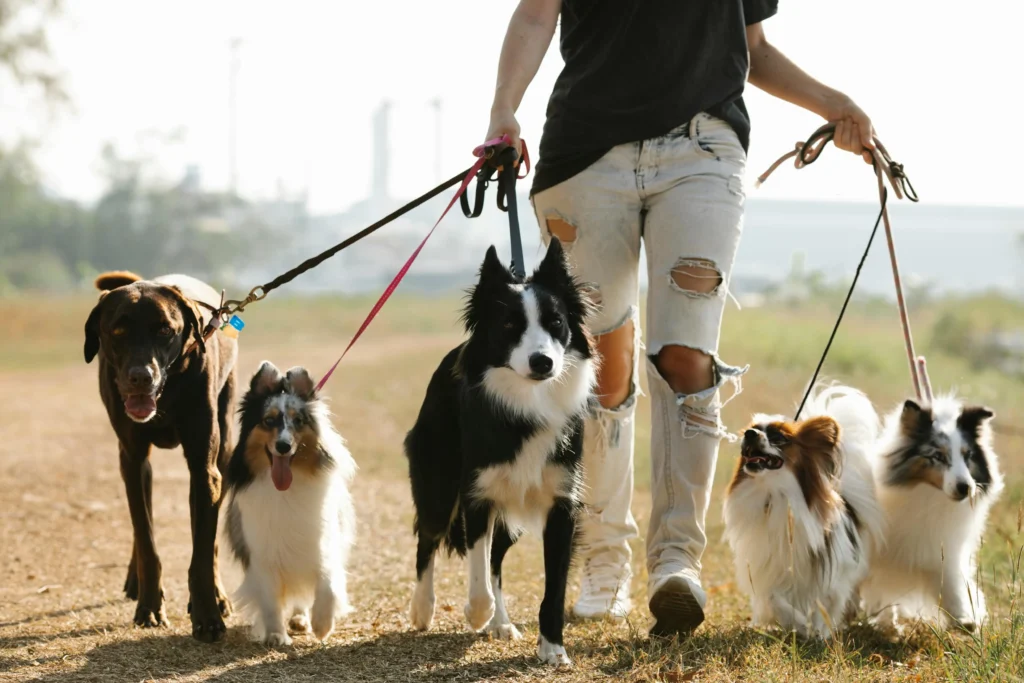
Regulatory Landscape for Dog Breeding
Unlike some states with comprehensive breeder licensing programs, Vermont’s approach is more decentralized. Here’s a breakdown of the key points:
- No Statewide Breeder Licensing: Vermont doesn’t have a mandatory licensing system for dog breeders.
- Municipal Kennel Permits: Some Vermont towns and cities require kennel permits for breeders selling dogs. Research local ordinances to determine if this applies in your area. These permits might have specific requirements for kennel facilities and animal care practices.
- Focus on Consumer Protection Laws: Vermont’s consumer protection laws offer some protections for dog buyers, including the right to a full or partial refund if the dog is found to be unfit for purchase due to illness or congenital disabilities within a specific timeframe.
Responsible Breeding Practices
While there are no mandatory licensing requirements, responsible breeding practices are paramount in Vermont. Here are some key considerations:
- Breed Knowledge: Select a breed you’re passionate about and possess in-depth knowledge of its health needs, temperament, and breed standards.
- Genetic Screening: Reputable breeders perform genetic screenings on their breeding stock to minimize the risk of passing on hereditary diseases to puppies. Utilize DNA testing offered by reputable organizations.
- Health Testing: Conduct appropriate health screenings for the chosen breed to identify potential health issues in breeding dogs before breeding commences.
- Veterinarian Partnership: Maintain a strong relationship with a qualified veterinarian for guidance on animal care, health testing protocols, and proper breeding practices.
Finding Reputable Dog Breeders
If you’re considering purchasing a puppy from a breeder in Vermont, prioritizing responsible breeders is essential. Here are some tips for finding reputable breeders:
- Breed Clubs: Contact breed clubs or associations recognized by the American Kennel Club (AKC) or other reputable canine organizations. These organizations often maintain directories of ethical breeders within their breed community.
- Online Resources: While exercising caution, some online resources can help locate breeders, but prioritize those affiliated with established breed clubs or organizations.
- Recommendations: Seek recommendations from veterinarians, dog trainers, or other reputable sources within the dog community.
Red Flags to Watch Out for When Choosing a Breeder
Be wary of breeders exhibiting these practices:
- Unwillingness to Answer Questions: Reputable breeders are transparent and happy to answer questions about their breeding practices, health testing protocols, and the lineage of their dogs.
- Unsanitary Conditions: Breeding facilities should be clean, well-maintained, and provide adequate space and care for the dogs.
- Early Puppy Separation: Puppies should remain with their mother and littermates for at least eight weeks for proper socialization and development.
Dog Genetics and Hereditary Conditions
Knowledge of dog genetics is crucial for responsible breeding. Here are some key points:
- Hereditary Conditions: Certain dog breeds are predisposed to specific genetic health conditions. Responsible breeders take steps to minimize the risk of passing on these conditions through careful breeding practices and genetic testing.
- Genetic Diversity: Maintaining genetic diversity within a breed helps reduce the risk of hereditary health problems. Reputable breeders strive for a balance between adhering to breed standards and maintaining a healthy gene pool.
Additional Resources
Here are some resources for responsible dog breeding practices in Vermont:
- Vermont Veterinary Medical Association: Offers resources and information for veterinarians in Vermont, some of which might be applicable to breeding practices
- American Kennel Club (AKC): Provides information on responsible breeding practices, breed standards, and finding reputable breeders
- The Canine Health Information Center (CHIC): Offers a database of dogs screened for genetic diseases
Dog Environmental Impact Laws in Vermont
Vermont, renowned for its pristine landscapes, vibrant communities, and commitment to environmental stewardship, welcomes canine companions with open arms. However, dog ownership comes with environmental responsibilities. While there aren’t specific state-wide laws solely targeting dog waste, Vermont enforces various regulations and promotes best practices to minimize the environmental impact of our furry friends.

Responsible Dog Waste Management
Dog waste left on the ground decomposes slowly and can contribute to environmental pollution. Here’s why responsible waste management is crucial:
- Water Contamination: Left uncollected, dog waste can wash into waterways, contaminating drinking water sources and harming aquatic ecosystems. Bacteria from dog waste can also contribute to harmful algal blooms.
- Public Health Concerns: Dog waste can harbor harmful pathogens that pose health risks to humans and other animals.
- Unpleasant Aesthetics: Dog waste detracts from the beauty of Vermont’s natural spaces and can be unpleasant for everyone enjoying the outdoors.
Dog Waste Management Laws
There aren’t state-wide dog waste management laws in Vermont. However, most municipalities have leash laws and waste disposal ordinances in place. Here’s what you need to know:
- Municipal Ordinances: Most Vermont towns and cities have animal control ordinances mandating dog owners to pick up and properly dispose of their dog’s waste. These ordinances might specify fines for non-compliance.
- Leash Laws: Many leash laws in Vermont require dogs to be leashed on trails, public pathways, and non-designated off-leash areas. This helps prevent dogs from wandering and potentially leaving waste in unauthorized locations.
Dog Waste Disposal Options
Most dog parks and public recreation areas in Vermont provide dog waste disposal bags and bins. Here are some additional tips:
- Carry Disposable Bags: Always carry disposable waste bags with you on walks and hikes.
- Double Bagging: Consider double bagging waste for added security and odor control.
- Dispose of Waste Properly: Tie waste bags securely and dispose of them in designated bins or trash receptacles. If no bins are available, pack out the waste with you.
Minimizing Your Dog’s Environmental Footprint
Responsible dog ownership extends beyond waste management. Here are some eco-friendly practices to consider:
- Sustainable Food Choices: Explore eco-friendly dog food options made with sustainable ingredients and recyclable packaging.
- Water Conservation: Utilize water-saving techniques when bathing your dog or use a leave-in conditioner to minimize water usage.
- Biodegradable Waste Bags: Opt for biodegradable waste bags that decompose faster than traditional plastic bags.
- Eco-Friendly Toys and Accessories: Choose durable, eco-friendly dog toys and accessories made from recycled materials.
Leash Laws and Minimizing Environmental Impact
Leash laws in Vermont play a role in protecting the environment. Here’s how:
- Habitat Protection: Keeping dogs leashed in designated areas helps protect sensitive wildlife habitats and minimize disruptions to native species.
- Preventing Erosion: Leashing dogs on trails helps prevent them from trampling vegetation and contributing to soil erosion.
Enjoying the Outdoors with Your Dog Responsibly
Vermont offers a plethora of outdoor adventures for you and your furry friend. Here are some tips for minimizing your environmental impact while exploring:
- Stick to Designated Trails: Stay on designated trails to minimize your impact on natural ecosystems.
- Respect Wildlife: Keep your dog leashed in areas with wildlife and avoid disturbing nesting grounds or dens.
- Leave No Trace: Practice Leave No Trace principles by packing out all waste, including dog waste, and minimizing your overall impact on the environment.
Additional Resources
Here are some resources to help you be a responsible and eco-friendly dog owner in Vermont:
- Leave No Trace Center for Outdoor Ethics: Provides information on Leave No Trace principles and dog-friendly outdoor recreation
- Vermont Department of Forests, Parks, and Recreation: Offers resources and information on Vermont state parks and recreation areas, many of which are dog-friendly
- Sustainable Vermont: A non-profit organization promoting environmental sustainability in Vermont, with resources that might be applicable to pet ownership
Dog Behavioural Training Laws in Vermont
Vermont, a state known for its picturesque landscapes and vibrant communities, welcomes canine companions with open arms. Responsible dog ownership, however, extends beyond just providing love and care. Training your dog for good behavior ensures a happy life for your furry friend and fosters a harmonious coexistence with your neighbors and the environment. While Vermont doesn’t have specific laws mandating dog training, the state encourages responsible pet ownership through various resources and promotes positive reinforcement training methods.
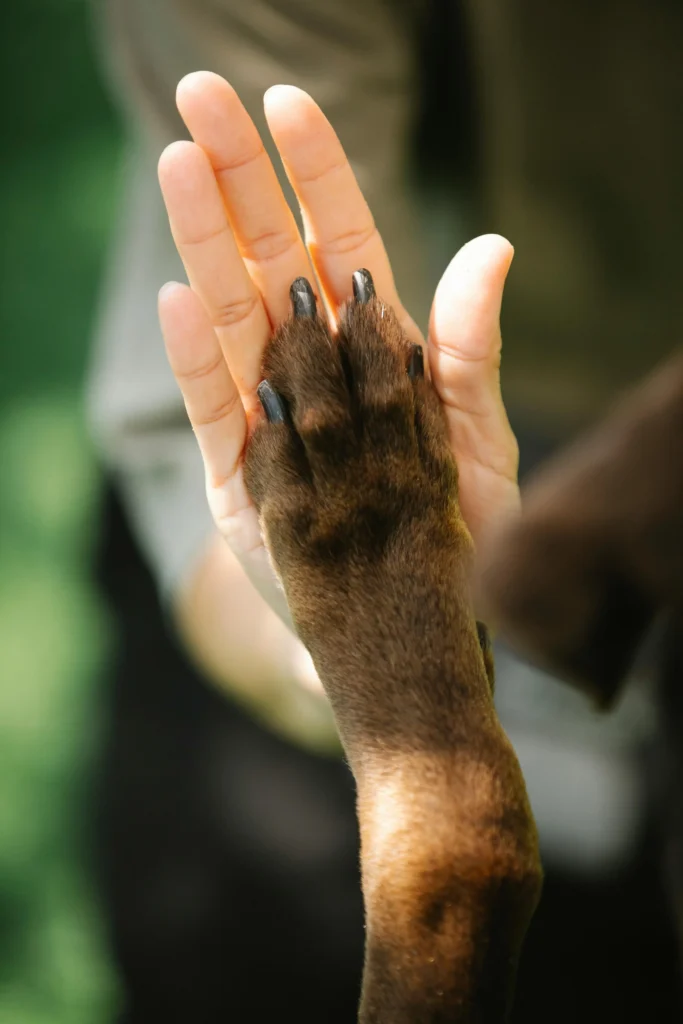
The Importance of Dog Training
Dog training offers a multitude of benefits for both you and your dog:
- Improved Communication: Training fosters better communication between you and your dog, strengthening your bond and allowing you to understand their needs and signals.
- Safety and Security: A well-trained dog is more manageable in public settings, reducing the risk of accidents or altercations with other animals or people.
- Reduced Behavioral Issues: Training helps address potential behavioral problems like barking, jumping, or chewing, leading to a more peaceful and enjoyable life for everyone.
- Mental Stimulation: Training provides mental stimulation for dogs, keeping them engaged and preventing boredom that can lead to destructive behaviors.
- Socialization: Proper socialization through training helps dogs interact confidently and calmly with other animals and people, promoting positive interactions.
Dog Training Laws
There are no state-mandated dog training laws in Vermont. However, some municipalities might have ordinances related to specific behavioral issues, such as excessive barking. Here’s what you need to know:
- Municipal Leash Laws: Many Vermont towns and cities have leash laws requiring dogs to be leashed in public spaces. Proper leash training is crucial for compliance with these regulations.
- Animal Control Ordinances: Some animal control ordinances might address specific behavioral problems, such as excessive barking or aggression. Understanding these ordinances can help ensure your dog doesn’t violate any local regulations.
Choosing a Dog Trainer
Selecting the right dog trainer is crucial for a positive and successful training experience. Here are some factors to consider:
- Training Methods: Look for trainers who utilize positive reinforcement methods based on reward and praise rather than punishment or dominance techniques.
- Experience and Qualifications: Choose a trainer with experience in handling dogs of your breed and addressing the specific needs of your canine companion.
- Certification: While not mandatory in Vermont, consider trainers certified by reputable organizations like the Certification Council for Professional Dog Trainers (CCPDT).
- Training Philosophy: Find a trainer whose philosophy aligns with your values and training goals.
Dog Training Resources
Vermont offers a variety of resources to help you train your dog:
- Dog Training Classes: Many veterinary clinics, pet stores, and dog training facilities offer group and private training classes.
- Online Resources: While online resources can provide valuable information, prioritize those created by reputable trainers and organizations.
- Books and Articles: Numerous books and articles offer guidance on dog training techniques. Look for those based on positive reinforcement methods.
Positive Reinforcement Training
Vermont, like many states, emphasizes positive reinforcement training as the preferred approach for canine behavior modification. Here’s why:
- Effectiveness: Positive reinforcement promotes desirable behaviors through rewards and praise, leading to faster and more sustainable results.
- Human-Dog Bond: Positive training builds a stronger bond between you and your dog based on mutual respect and trust.
- Stress-Free Learning: This method avoids fear, intimidation, or punishment, creating a positive learning experience for your dog.
Additional Considerations
Beyond formal training, responsible dog ownership encompasses several aspects:
- Socialization: Socialize your dog from a young age to ensure they interact confidently and calmly with people and other animals.
- Exercise: Provide your dog with regular exercise to meet their physical and mental needs. Daily walks and playtime are essential.
- Mental Stimulation: Engage your dog’s mind through interactive toys, puzzle feeders, and training sessions.
- Responsible Pet Care: Provide proper nutrition, veterinary care, and a loving environment for your furry friend.
Dog Protection and Rescue Laws in Vermont
Vermont, a state renowned for its breathtaking scenery and compassionate communities, takes animal welfare seriously. This dedication extends to lost, abandoned, and neglected dogs. While there aren’t specific state laws solely focused on dog rescue, Vermont enforces animal cruelty statutes and fosters a collaborative environment where animal control agencies, shelters, rescue organizations, and responsible citizens work together to protect and rehome vulnerable dogs.

The Importance of Dog Protection and Rescue
Sadly, countless dogs end up in shelters or abandoned each year. These dogs deserve a second chance at a loving home. Here’s why dog protection and rescue are crucial:
- Preventing Suffering: Providing safe havens for lost, abandoned, or neglected dogs protects them from further harm and suffering.
- Rehoming Opportunities: Rescues and shelters work tirelessly to find dogs loving forever homes, where they can thrive and receive the care they deserve.
- Promoting Responsible Ownership: Rescue efforts often advocate for responsible pet ownership, encouraging spaying and neutering to prevent pet overpopulation.
Animal Cruelty Laws in Vermont
Vermont takes animal cruelty seriously. Title 13 of the Vermont Statutes outlines animal cruelty laws, including:
- Prohibition of Cruelty: The law prohibits acts like overworking, underfeeding, depriving an animal of necessary medical attention, or inflicting unnecessary pain or suffering.
- Reporting Requirements: If you suspect animal cruelty, you have a legal obligation to report it to your local animal control officer or law enforcement agency.
The Role of Animal Control Agencies
Animal control agencies in Vermont play a vital role in dog protection:
- Responding to Calls: Animal control officers respond to calls about stray, abandoned, or neglected dogs.
- Impoundment: If a dog is found wandering at large or appears neglected, animal control may impound the dog for safekeeping.
- Reuniting Dogs with Owners: Animal control works to reunite lost dogs with their owners through microchipping, identification tags, and public outreach.
- Shelter Placement: If a dog remains unclaimed or their owner relinquishes them, animal control might facilitate placement with a shelter or rescue organization.
Vermont’s Vibrant Network of Animal Shelters and Rescue Organizations
Vermont boasts a network of dedicated animal shelters and rescue organizations committed to dog welfare:
- Municipal Shelters: Many towns and cities operate municipal shelters that house stray and abandoned dogs.
- Non-Profit Rescues: Numerous non-profit rescue organizations specialize in rescuing specific breeds, senior dogs, or dogs with special needs.
- Adoption Process: Shelters and rescues have adoption processes in place to ensure dogs are placed in suitable and loving forever homes.
How You Can Help Protect and Rescue Dogs
There are numerous ways you can contribute to dog protection and rescue efforts in Vermont:
- Adopt, Don’t Shop: Consider adopting a dog from a shelter or rescue instead of buying from a breeder. This gives a deserving dog a second chance at happiness.
- Volunteer Your Time: Shelters and rescues often rely on volunteers to walk dogs, socialize them, and assist with administrative tasks.
- Donate: Financial donations help shelters and rescues provide food, medical care, and other essentials for dogs in their care.
- Foster Care: Become a foster parent for dogs in need of temporary care while they wait for their forever homes.
- Spread Awareness: Raise awareness about dog protection and rescue efforts in your community. Encourage responsible pet ownership practices.
Reputable Dog Shelters or Rescues
Here are some resources to help you find a reputable shelter or rescue in Vermont:
- The Vermont Humane Federation: Provides a directory of member shelters and rescues across the state
- The National Council on Pet Population Control & Prevention (NCPP): Offers a searchable database of animal shelters and rescues nationwide
- Petfinder: A popular website featuring adoptable dogs from shelters and rescues across the US
Dog Entertainment and Work Laws in Vermont
Vermont, a state celebrated for its picturesque landscapes and vibrant communities, embraces the human-animal bond. While there aren’t specific state-wide laws solely focused on dog entertainment or work, Vermont fosters an environment where responsible dog ownership and animal welfare are prioritized. This comprehensive guide explores the legalities and considerations surrounding dog entertainment and work in Vermont, empowering you to understand the landscape and make informed decisions regarding your furry friend’s activities.

Dog Entertainment
Vermont offers a plethora of ways to enjoy the outdoors with your canine companion. However, responsible dog entertainment is crucial for both their safety and the well-being of others. Here are some key points to consider:
- Leash Laws and Off-Leash Areas: Many Vermont towns and cities have leash laws mandating dogs to be leashed in public spaces. Designated off-leash areas provide safe spaces for controlled play and socialization. Always research leash laws and etiquette before venturing out with your dog.
- Respecting Wildlife: Keep your dog leashed in areas with wildlife to minimize disruptions and protect sensitive habitats.
- Waste Management: Always carry disposable waste bags and properly dispose of your dog’s waste to maintain a clean environment.
- Choosing Dog-Friendly Activities: Opt for activities suitable for your dog’s breed, age, and physical capabilities. Popular options include hiking, swimming (in designated areas), and dog parks.
Dog Entertainment Resources
- Vermont Department of Forests, Parks, and Recreation: https://fpr.vermont.gov/ (Provides information on Vermont state parks and recreation areas, many of which are dog-friendly)
- BringFido – Dog Friendly VT: [invalid URL removed] (Website listing dog-friendly activities, restaurants, and accommodations in Vermont)
Dog Work Laws
There isn’t a single, comprehensive set of laws governing dog work in Vermont. However, some regulations and best practices come into play depending on the type of work your dog performs. Here’s a breakdown of key considerations:
- Service Animals: Federal laws protect the rights of individuals with disabilities to be accompanied by trained service animals in public places.
- Emotional Support Animals (ESAs): While ESAs are not granted the same public access rights as service animals, some employers might allow ESAs in the workplace with proper documentation and accommodation arrangements.
- Working Dogs in Specific Industries: Regulations for working dogs might vary depending on the industry. For example, regulations for working farm dogs or hunting dogs might fall under agricultural or wildlife management statutes.
Considerations for Utilizing Dogs in Work Settings
If you’re considering incorporating your dog into your work environment, here are some crucial factors to address:
- Safety: Ensure your dog is well-trained, socialized, and comfortable in a work environment to minimize potential disruptions or safety hazards.
- Animal Welfare: Prioritize your dog’s well-being by providing adequate breaks, access to water, and a comfortable workspace.
- Employer Policies: Check with your employer regarding their policies on animals in the workplace.
- Local Regulations: Research any local regulations or permitting requirements that might apply to specific working dog roles.
Alternative Avenues for Dog “Work”
While formal work settings might not always be suitable, there are other ways your dog can contribute and engage their skills:
- Therapy Dog Training: Consider training your dog for therapy work, offering emotional support to individuals in hospitals, schools, or assisted living facilities.
- Search and Rescue Training: Some dedicated dog owners train their dogs for search and rescue operations, contributing to valuable community services.
Dog Technology and Innovation Laws in Vermont
Vermont, a state renowned for its natural beauty and progressive spirit, is embracing the growing world of pet technology. While there are no specific laws solely focused on dog technology and innovation, Vermont fosters an environment where responsible pet ownership and animal welfare remain paramount.
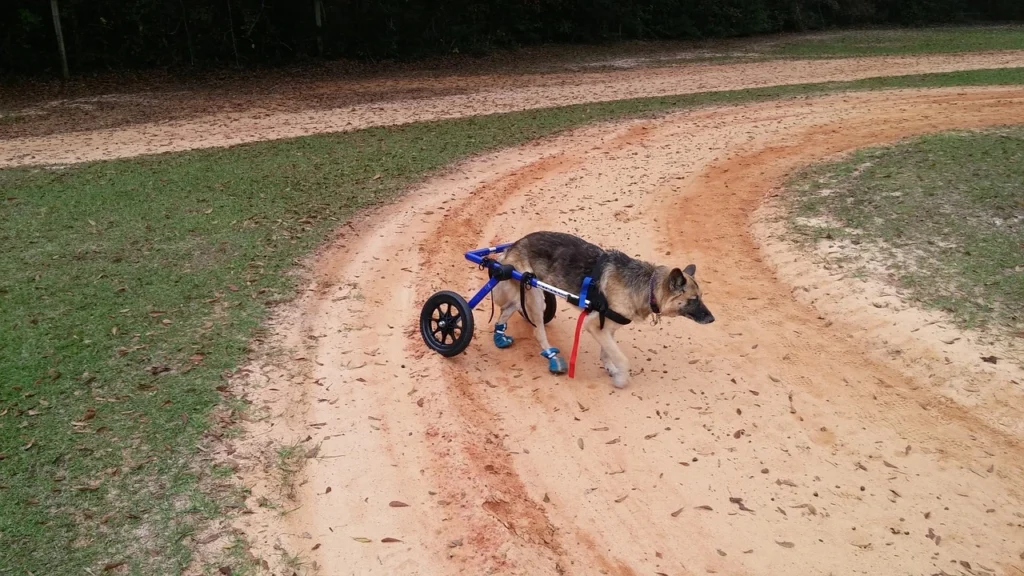
The Rise of Dog Technology
The world of pet technology is booming, offering innovative products and services designed to enhance dog health, safety, and overall well-being. Here’s a glimpse into some exciting advancements:
- Wearable Tech: Smart collars and trackers monitor vital signs, activity levels, and location, providing valuable insights into your dog’s health and behavior.
- Remote Training Devices: Electronic collars and clicker training tools with remote capabilities can aid in training from a distance.
- Interactive Toys and Food Dispensers: Tech-enabled toys stimulate canine minds, while automated feeders dispense food at scheduled times, promoting portion control and healthy eating habits.
- Pet Cameras and Monitors: Live video cameras and monitoring systems allow you to keep an eye on your dog remotely, offering peace of mind and the ability to interact with them even when you’re not home.
- Telehealth and Virtual Vet Services: Emerging applications and platforms connect pet owners with veterinarians remotely for consultations, potentially improving access to veterinary care.
Regulatory Landscape
As pet technology is a relatively new and evolving field, Vermont doesn’t have a comprehensive set of laws specifically governing these products. However, some general regulations and best practices come into play:
- Focus on Animal Welfare: Any pet technology product should prioritize the safety and well-being of your dog. Avoid devices that cause discomfort, pain, or anxiety.
- Veterinarian Consultation: Consult with your veterinarian before using any pet technology product, especially those that impact your dog’s health or training methods.
- Data Privacy Considerations: Some pet tech products collect and store data about your dog. Be mindful of data privacy practices and ensure the security of your pet’s information.
Finding Reputable Dog Technology Products
With the abundance of pet tech options, selecting reputable products is crucial. Here are some tips:
- Research the Brand and Product: Research the company’s reputation, product reviews, and safety certifications before purchasing.
- Prioritize Functionality: Choose products that address your specific needs and suit your dog’s temperament and lifestyle.
- Consider Usability: Ensure the technology is user-friendly and doesn’t require complex setup or cause undue stress for your dog.
- Focus on Ethical Practices: Support companies committed to ethical pet practices and prioritize animal welfare in their product development.
Emerging Innovations in Dog Health Technology
The future of pet technology holds exciting promise for canine health:
- Wearable Tech for Early Disease Detection: Advanced wearables might monitor vital signs and activity patterns, potentially aiding in early detection of health issues.
- Telehealth Advancements: Telehealth consultations could become more sophisticated, allowing remote veterinarians to conduct more advanced examinations with the aid of technology.
- DNA Testing and Personalized Care: Advancements in dog DNA testing might lead to customized nutrition plans, preventive healthcare strategies, and breed-specific health management.
Responsible Integration of Dog Technology
As Vermont embraces technological advancements, responsible integration of pet tech is key:
- Prioritize Traditional Training Methods: While some technology can assist with training, prioritize positive reinforcement methods and building a strong bond with your dog.
- Technology is a Tool, Not a Replacement: Pet tech should complement your care, not replace essential aspects of pet ownership like walks, playtime, and quality interaction.
- Maintain a Healthy Balance: Resist relying solely on technology and ensure your dog receives adequate physical and mental stimulation through traditional means.
Human Coexistence Laws in Vermont
Vermont, a state celebrated for its stunning scenery and tight-knit communities, recognizes the profound bond between humans and dogs. While there aren’t specific laws solely titled “human coexistence laws,” Vermont fosters an environment that encourages responsible dog ownership and promotes positive interactions between people and their canine companions.

The Importance of Human-Dog Coexistence
The human-dog bond offers numerous benefits for both parties:
- Improved Well-being: Studies suggest owning a dog can decrease stress, promote physical activity, and offer companionship, contributing to overall well-being for both humans and dogs.
- Socialization and Community Building: Walking your dog provides opportunities for interaction with other dog owners, fostering a sense of community.
- Enhanced Training and Behavior: Positive reinforcement training strengthens the human-dog bond and promotes good behavior in dogs.
Positive Human-Dog Coexistence
Vermont offers a plethora of resources and opportunities to strengthen the bond between humans and dogs:
- Dog-Friendly Establishments: Many restaurants, shops, and businesses in Vermont welcome well-behaved dogs, allowing you to include your furry friend in your daily routines.
- Dog Parks and Off-Leash Areas: Designated dog parks provide safe spaces for dogs to socialize and play with their human companions.
- Training Classes and Workshops: Numerous training facilities and organizations offer classes and workshops focused on building a strong human-dog bond through positive reinforcement techniques.
- Veterinarian Guidance: Veterinarians play a crucial role in promoting canine health and well-being, providing advice on training, behavior management, and overall care, which positively impacts human-dog interactions.
Legal Considerations
While there aren’t specific “human coexistence laws,” some regulations contribute to a positive environment for dog owners and their companions:
- Leash Laws: Most Vermont towns and cities have leash laws mandating dogs to be leashed in public spaces. This ensures responsible ownership and safety for both humans and other animals.
- Waste Management Laws: Most municipalities have ordinances requiring dog owners to pick up and dispose of their dog’s waste properly. This helps maintain a clean and pleasant environment for everyone enjoying Vermont’s beauty.
Building a Strong Human-Dog Bond
Beyond legalities, several practices can strengthen your bond with your dog:
- Positive Reinforcement Training: Utilizing positive reinforcement methods based on reward and praise fosters trust and respect between you and your dog.
- Quality Time and Interaction: Dedicate time for walks, playtime, and cuddling to build a strong connection with your furry friend.
- Socialization: Socialize your dog from a young age to ensure they interact confidently and calmly with people and other animals.
- Mental Stimulation: Provide mental stimulation for your dog through interactive toys, training sessions, and enrichment activities.
- Meeting Your Dog’s Needs: Ensure your dog receives proper nutrition, veterinary care, exercise, and mental stimulation to maintain their physical and emotional well-being.
Additional Considerations
Responsible dog ownership goes beyond building a bond:
- Understanding Your Dog’s Breed: Research your dog’s breed to understand their specific needs, temperament, and exercise requirements.
- Respecting Others: Be mindful of others when you’re out with your dog. Clean up after your dog and avoid situations where your canine companion might disrupt others.
- Choosing the Right Dog: Select a dog breed that aligns with your lifestyle and living situation to ensure a harmonious coexistence.
Other Relevant Dog Laws in Vermont
Canine Good Citizen (CGC) Programs and Legal Benefits
- Canine Good Citizen (CGC) Programs: The American Kennel Club (AKC) offers a standardized CGC program certifying dogs who demonstrate good manners and basic obedience skills.
- Potential Benefits: While not mandated by law, some municipalities might offer incentives like reduced dog licensing fees for CGC-certified dogs. Participating in CGC training demonstrates responsible ownership and promotes well-behaved canine companions.
Dog Insurance and Coverage Laws
- Dog Insurance: Dog insurance is not mandatory in Vermont. However, it can provide financial protection for unexpected veterinary expenses, accidents, or liability claims.
- Coverage Options: Dog insurance policies vary, with some covering accidents and illnesses, while others might offer additional benefits like liability coverage or wellness plans.
Laws Regarding Dogs in Hot Cars and Animal Endangerment
- Vermont’s Anti-Cruelty Laws: Title 13 of the Vermont Statutes outlines animal cruelty laws, including leaving an animal unattended in a vehicle under conditions that could cause harm due to extreme temperature.
- Leaving Your Dog in a Hot Car: Never leave your dog unattended in a hot car, even for a short period. The temperature inside a parked car can rise rapidly, posing a serious health threat to your dog.
Legal Aspects of Dog Parks and Shared Spaces
- Leash Laws and Off-Leash Areas: Most Vermont towns and cities have leash laws requiring dogs to be leashed in public spaces. Designated off-leash areas provide safe spaces for controlled play and socialization.
- Respecting Others: Always follow park rules and etiquette when visiting dog parks. Ensure your dog is well-trained, socialized, and up-to-date on vaccinations before entering a dog park.
- Waste Management: Clean up after your dog promptly at dog parks and other shared spaces.
Dog-Related Property Damage and Homeowner’s Insurance
- Homeowner’s Insurance: Most homeowner’s insurance policies cover dog-related liability claims up to a specific limit. However, exclusions or limitations might apply depending on the breed or specific incident.
- Understanding Your Policy: Review your homeowner’s insurance policy thoroughly to understand dog-related coverage and potential liability situations.
Service and Working Dog Laws in Employment and Public Access
- Federal Laws: The Americans with Disabilities Act (ADA) protects the rights of individuals with disabilities to be accompanied by trained service animals in public places.
- Emotional Support Animals (ESAs): While ESAs are not granted the same public access rights as service animals, some employers in Vermont might allow ESAs in the workplace with proper documentation and accommodation arrangements.
- Working Dogs in Specific Industries: Regulations for working dogs might vary depending on the industry. For example, regulations for working farm dogs or hunting dogs might fall under agricultural or wildlife management statutes.
Animal Welfare and Protection Laws Against Neglect and Abandonment
- Vermont’s Anti-Cruelty Laws: Title 13 of the Vermont Statutes outlines animal cruelty laws, including:
- Withholding necessary food, water, or shelter.
- Inflicting unnecessary pain or suffering.
- Abandoning an animal.
- Reporting Requirements: If you suspect animal cruelty, you have a legal obligation to report it to your local animal control officer or law enforcement agency.
Vermont embraces responsible dog ownership and the human-animal bond. While there aren’t breed-specific restrictions or laws solely on dog entertainment or work, the state enforces animal cruelty statutes and promotes responsible pet care. Understanding leash laws, waste management, and licensing ensures safety and a clean environment for all.
Microchipping your dog and prioritizing their well-being are crucial aspects of ownership. Dog technology offers exciting possibilities, but prioritize traditional training methods and prioritize your furry friend’s well-being. Following dog laws demonstrates responsible ownership and contributes to a safe and enjoyable environment for everyone in Vermont.
FAQs
Can I bring my dog to hike with me in Vermont?
Yes, Vermont offers many dog-friendly hiking trails! However, leash laws typically apply, so ensure your dog is leashed on trails unless designated otherwise. Always check specific regulations for the park or area you plan to visit. Some trails might have restrictions on certain breeds or require proof of vaccinations for your dog.
What are the rules for traveling with my dog in Vermont?
There are no statewide regulations on traveling with your dog within Vermont. However, some public transportation options might have restrictions on pets. When traveling by car, ensure your dog is securely harnessed or crated for their safety and to avoid distractions while driving.
Are there any noise ordinances regarding barking dogs in Vermont?
Many Vermont municipalities have noise ordinances that might address excessive barking. These ordinances typically define what constitutes excessive barking (duration, frequency) and potential consequences for violations. If your neighbor’s dog barks excessively, document the issue and try to address it politely with your neighbor first. If the problem persists, contact your local animal control officer.
Are there any breed-specific restrictions in Vermont?
Vermont doesn’t have a statewide ban on any specific dog breeds. However, some municipalities might have breed-specific restrictions in place. It’s crucial to research any local ordinances regarding dog breeds before adopting or bringing your dog to a specific town or city in Vermont.
What are the regulations for breeding dogs in Vermont?
There are no specific licensing requirements for breeding dogs in Vermont. However, responsible breeders prioritize the health and well-being of their breeding stock and puppies. If you plan to breed your dog, ensure you understand the ethical considerations, health testing requirements for breeding stock, and proper puppy socialization practices.

